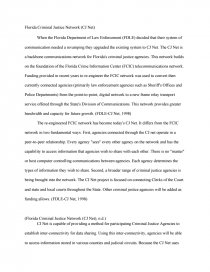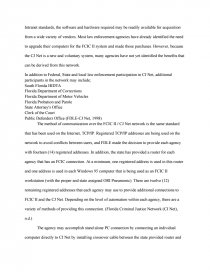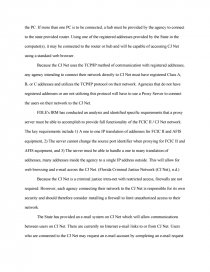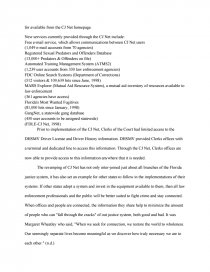Florida Criminal Justice Network
Essay by review • December 26, 2010 • Research Paper • 1,252 Words (6 Pages) • 2,125 Views
Florida Criminal Justice Network (CJ Net)
When the Florida Department of Law Enforcement (FDLE) decided that their system of communication needed a revamping they upgraded the existing system to CJ Net. The CJ Net is a backbone communications network for Florida's criminal justice agencies. This network builds on the foundation of the Florida Crime Information Center (FCIC) telecommunications network. Funding provided in recent years to re-engineer the FCIC network was used to convert then currently connected agencies (primarily law enforcement agencies such as Sheriff's Offices and Police Departments) from the point-to-point, digital network to a new frame relay transport service offered through the State's Division of Communications. This network provides greater bandwidth and capacity for future growth. (FDLE-CJ Net, 1998)
The re-engineered FCIC network has become today's CJ Net. It differs from the FCIC network in two fundamental ways. First, agencies connected through the CJ net operate in a peer-to-peer relationship. Every agency "sees" every other agency on the network and has the capability to access information that agencies wish to share with each other. There is no "master" or host computer controlling communications between agencies. Each agency determines the types of information they wish to share. Second, a broader range of criminal justice agencies is being brought into the network. The CJ Net project is focused on connecting Clerks of the Court and state and local courts throughout the State. Other criminal justice agencies will be added as funding allows. (FDLE-CJ Net, 1998)
(Florida Criminal Justice Network (CJ Net), n.d.)
CJ Net is capable of providing a method for participating Criminal Justice Agencies to establish inter-connectivity for data sharing. Using this inter-connectivity, agencies will be able to access information stored in various counties and judicial circuits. Because the CJ Net uses Intranet standards, the software and hardware required may be readily available for acquisition from a wide variety of vendors. Most law enforcement agencies have already identified the need to upgrade their computers for the FCIC II system and made those purchases. However, because the CJ Net is a new and voluntary system, many agencies have not yet identified the benefits that can be derived from this network.
In addition to Federal, State and local law enforcement participation in CJ Net, additional participants in the network may include;
South Florida HIDTA
Florida Department of Corrections
Florida Department of Motor Vehicles
Florida Probation and Parole
State Attorney's Office
Clerk of the Court
Public Defenders Office (FDLE-CJ Net, 1998)
The method of communication over the FCIC II / CJ Net network is the same standard that has been used on the Internet, TCP/IP. Registered TCP/IP addresses are being used on the network to avoid conflicts between users, and FDLE made the decision to provide each agency with fourteen (14) registered addresses. In addition, the state has provided a router for each agency that has an FCIC connection. At a minimum, one registered address is used in this router and one address is used in each Windows 95 computer that is being used as an FCIC II workstation (with the proper and state assigned ORI Pneumonic). There are twelve (12) remaining registered addresses that each agency may use to provide additional connections to FCIC II and the CJ Net. Depending on the level of automation within each agency, there are a variety of methods of providing this connection. (Florida Criminal Justice Network (CJ Net), n.d.)
The agency may accomplish stand alone PC connection by connecting an individual computer directly to CJ Net by installing crossover cable between the state provided router and the PC. If more than one PC is to be connected, a hub must be provided by the agency to connect to the state provided router. Using one of the registered addresses provided by the State in the computer(s), it may be connected to the router or hub and will be capable of accessing CJ Net using a standard web browser.
Because the CJ Net uses the TCP/IP method of communication with registered addresses, any agency intending to connect their network directly to CJ Net must have registered Class A, B, or C addresses and utilizes the TCP/IP protocol on their network. Agencies that do not have registered addresses or are not utilizing this protocol will have to use a Proxy Server to connect the users on their network to the CJ Net.
FDLE's IRM has conducted an analysis and identified specific requirements that a proxy server must be able to accomplish to provide full functionality of the FCIC II / CJ Net network. The key requirements include 1) A one to one IP translation of addresses for FCIC II and AFIS equipment, 2) The server cannot change the source port identifier when proxying for FCIC II and AFIS equipment, and 3) The server must be able to handle a one to many translation of addresses, many addresses inside the agency to a single IP address outside. This will allow for web browsing and e-mail across the CJ Net. (Florida Criminal Justice Network (CJ Net), n.d.)
Because the CJ Net is a criminal justice
...
...




